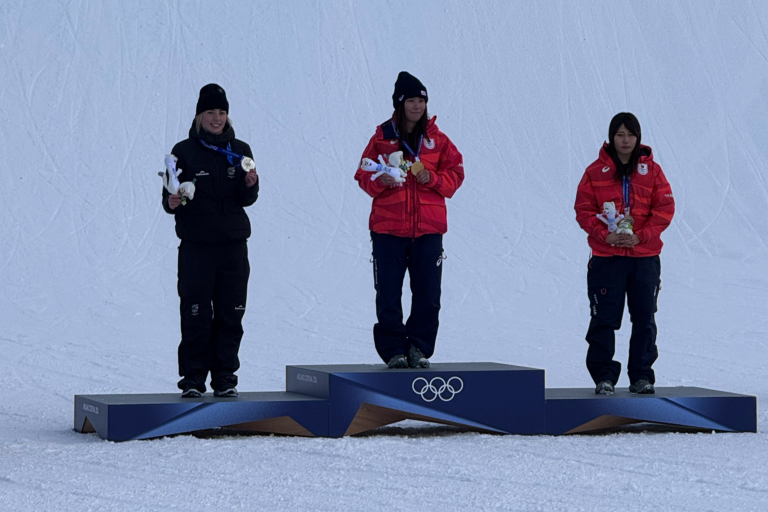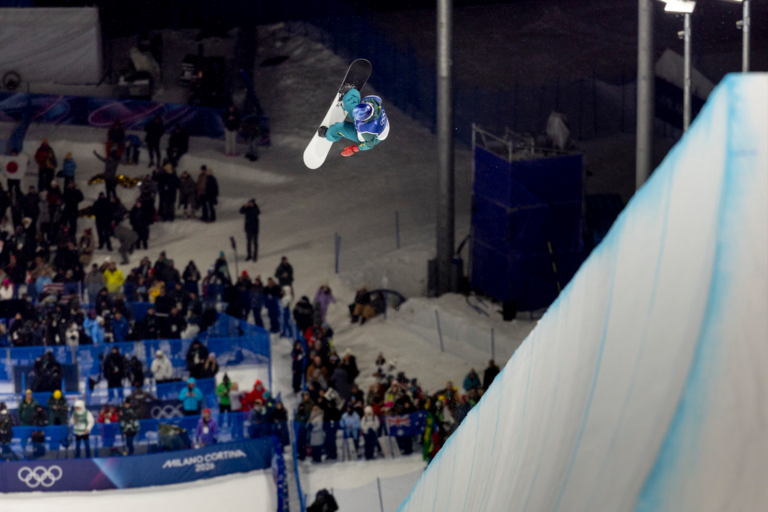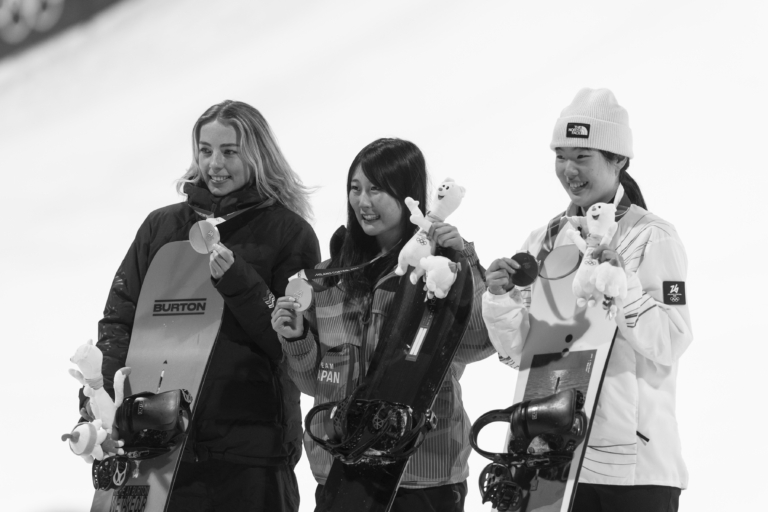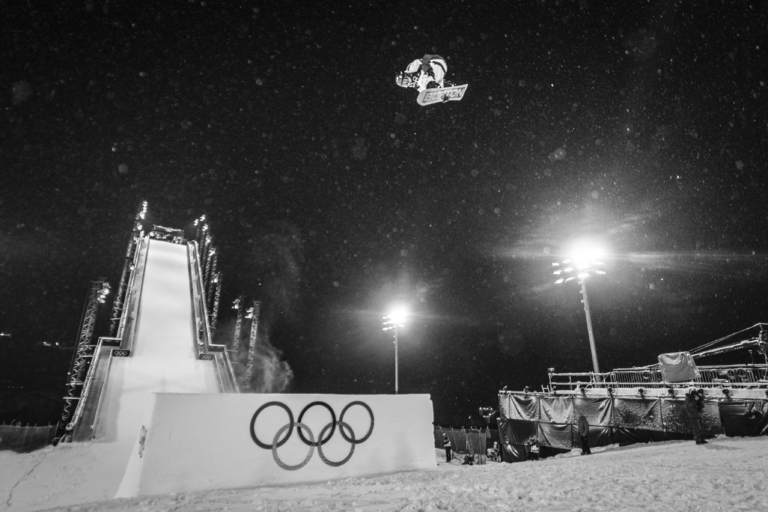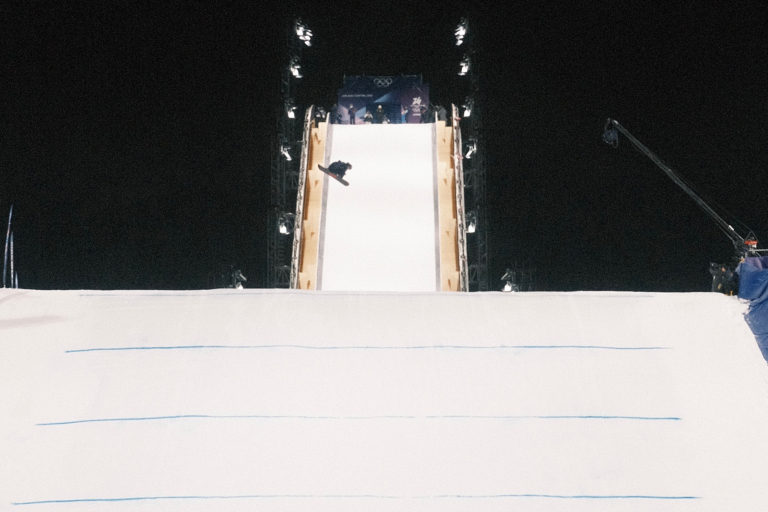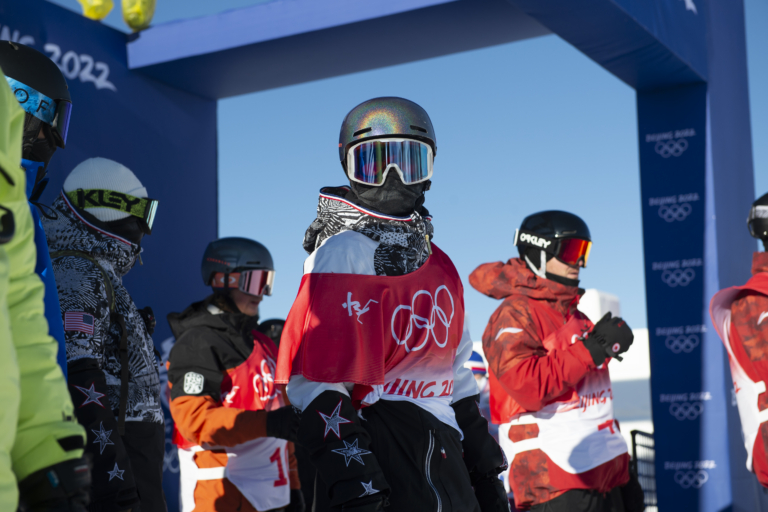Chloe Kim doesn’t really need an introduction. Even if you have never opened a snowboarding magazine, chances are you’ve heard of her. Chloe has so many accolades under her belt—Olympic gold, cereal boxes, ESPYs, Kids Choice Awards—it is hard to remember that she is just a 21-year-old woman trying to figure things out. That said, she seems to have it pretty figured out, which is a testament to her hard work and driven attitude, both which started well before she was able to actually drive.
I was introduced to Chloe, like most everyone else, through watching her land on contest podiums when she was only 13 years old (since then, her competition results have remained consistent as she has added countless medals from literally every halfpipe contest to her collection). As far as role models go, there are none above her in our space. She is one of only two snowboarders to ever score a perfect 100 in the pipe (although she doesn’t count hers because she feels there can always be room for improvement), and maybe even more impressive, is the only snowboarder to ever land on Time’s 100 Most Influential People list.
It wasn’t until Chloe was qualifying for her first Olympics that we actually met. Since then, we’ve spent plenty of time together shooting photos and hanging, but we have never hit the record button for an official interview. I was supposed to conduct one in Pyeongchang four years ago, but she was whisked away, probably to go talk to Bob Costas. But it is finally time. Bob Costas is busy not caring about snowboarding right now, so we hopped on the phone for an international call that I will be expensing to the magazine. – Mark Clavin

Alright. Do you want to officially get into this?
Yeah, let’s run it up.
Have you landed a 1260 in contest?
No.
Okay. But you—
I have it on lock.
And the last time you competed and did not get gold was the 2019 US Open?
Yeah.
And then you didn’t compete in 2020 US Open, correct? Xuetong Cai won that one.
Yeah, I was in school in 2020. But that 2019 one actually sucked because I broke my ankle in practice, and I kept riding. I thought, This is the last contest of the season, let’s ride. Probably wasn’t a good move. I probably should have pulled out because my ankle hurt a lot, but whatever, you only live once.
And you still got silver, so as a non-athlete, myself, I would say that’s still a win.
Honestly, I’m just like, Oh cool, we have a contest. I’ll be there. Just let me know when.
The first sentence of your Wikipedia page lists you as an American singer.
No way!
When does the album drop?
Wait, does it really say that?
It says, American snowboarder and singer.
No way. Dude, that’s actually hilarious.
I didn’t know that your Masked Singer career was going so well. How is Saas-Fee right now, coming off injury? The last time you competed, weren’t you taken on in a sled?
Oh yeah. Aspen?
Yeah, at World Champs.
Yeah. Did I even tell you what happened at that contest?
No.
So last season was my first season back on snow since Princeton, and also since breaking my ankle. I had an avulsion fracture on my fibula and had to get a screw drilled in to put the pieces back.
What is an avulsion fracture?
An avulsion fracture is when a chunk of bone breaks off from the main bone, so they had to screw it back together and then they also had to reattach my ligaments. So just being off snow for a little bit and then coming back kind of on the quicker side, and my body not being used to slamming again, I think my ankle was just a little more sensitive. It’s much better now.
That’s good.
At World Champs on the day of finals, I did a switch back three, little gust of wind hit me, I went straight to my face, but my face and my feet hit the ground at the same time. Re-tweaked an old injury, but we’re good now. Whenever you get surgery or have a big injury like that, it’s always going to be a little easier to aggravate.
You alluded to it already, but you’ve got a 1260 on lock, yeah?
Yeah, I don’t know. It’s one of those things where I really want to do it, I just need a good pipe to do it in. I actually learned a new trick, too, but it’s a secret. I’ll definitely be doing it this season. I have three new tricks for everyone.
Hat trick. Why did you feel you had to add three new tricks to your arsenal?
I’ve done the same contest run for so many years. It was like air, ten, ten, nine, McTwist—which is cool and it did well, but I was just getting bored.
It’s still winning, but other riders are creeping up on you now.
Oh, for sure. There’s doubles that are getting thrown down and everyone’s doing tens. Honestly, I just want to mix things up. I did a new run in Aspen for the World Champs and Grand Prix and I really liked it, so it was pretty much just building off of that and adding more big tricks to my bag so I could be more creative and just have fun. It gives me more flexibility as to what runs I can do. So, if the conditions are weird or whatever at a contest, I can pull something else out of that bag and not have to stick with the same runs.

Does that come into play with the switch method, too?
Yeah, for sure. You know I did that trick when I was 14 at X Games?
Yes. Why do you think that made headlines this past year so much?
I figured out how to do it way better. I have really wanted to start mixing up my runs. The first couple contests of the season, I was just coming back so I wanted to stick to what I knew. But toward the end—I know I’m a good enough snowboarder to not have to do the same stuff, so let’s just get it.
Who has your favorite switch method?
Me.
Do you think you’re putting pressure on yourself to learn new tricks or is it outside expectations and the rest of the field that are forcing you to up the ante?
I’ve been doing pro contests since I was 13 and I’ve built that back-to-back ten run. I was doing the when I was 15 and I just kept that same run. I mean, obviously, everything’s gotten bigger and better.
From the time before you could drive to now, when you can legally drink, you’ve been doing the same run?
Pretty much.
That’s crazy. I haven’t done anything for that long, ever.
I competed nonstop from when I was 13 until I was 19. Six years. You just get stuck in the routine. When I went to school, it was really a breath of fresh air and it made me see that it’s cool to try new things and mix it up a bit. That really inspired me to change my approach to competitive halfpipe snowboarding.
As far as going to school, it’s been pretty well documented why you left competitive snowboarding. You had a bit of the burnout factor?
Yeah. I was definitely really burnt out. After winning an Olympics, there’s just so much more stuff that you have to worry about outside of snowboarding and that was really draining. Snowboarding was my escape, but I couldn’t get away from everything else. All of that stuff gets really draining because it’s repetitive and I hated that.
Then the decision to come back. What happened there? Why did you come back?
I was always planning on coming back, but if I didn’t miss it after taking all season off, then my answer was to retire, clearly, or at least retire from competitions. I was in a dark place post-Olympics. I felt like everything I knew started to vanish and nothing felt very consistent in my life and that’s really important for me. If competing wasn’t bringing me joy, then what’s the point? I’m not going to go out there, train, and work hard if I’m not enjoying it. Through it all, I learned I’m the happiest when I’m learning new tricks, progressing as a snowboarder, and pushing the sport.
Did you feel like there was any pressure off once you left the spotlight for a bit or did the pressure just change?
School was really good for me because I was able to challenge myself in another way. Again, my life was just very repetitive yet so inconsistent, and school was consistent, but not repetitive. That brought me a lot of peace. I could really think about what I wanted during that year at school.
Did anything shift mindset-wise?
I think it just reminded me that there’s a world outside of snowboarding. You forget that sometimes. I think that when you feel pressured to do well in a contest, which I definitely have felt a lot, especially after the Olympics, it is good to be reminded that there’s life outside of snowboarding for everyone and it’s okay to take a step back and do something else, because snowboarding will always be there.
Do you want to talk about being in a dark place after the Olympics?
Yeah. I’m okay to talk about it. I was kind of having an identity crisis. Basically, after winning an Olympic gold medal, I was just thrown into the spotlight. I was completely caught off guard. I was warned about it, but I didn’t expect it to go to that extent. I was used to people recognizing me on the mountain, but then after the Olympics, people at Corner Bakery down the street were turning around, staring at me, taking pictures of me, and bombarding me, pretty much. It’s flattering. I love and appreciate it, but when you don’t expect it and don’t know how to handle it, it can make you feel extremely anxious. Before that, I lived a pretty chill life with my parents and I would just go snowboarding and do school online. I just went from that to—I have no idea.
You were 17 years old, dealing with as much press as someone that just came out of a hit movie. You were suddenly a big deal in the global culture.
Yeah. Then I’m going to all these music awards— all these crazy, cool things—and it’s fun and awesome, but it was really out of my comfort zone. It wasn’t something I was used to and I think it made me spiral. I was like, What is happening to me? What do I want? I don’t even know what I’m doing right now.
There have been a few snowboarders that have hit the mainstream, of course, but you and Shaun White are the two that have remained there. You’re in a different orbit. Do you have any idea why?
I don’t know. I think that’s what threw me off guard so much, because I was always looking at Torah Bright, Kelly Clark, and Hannah Teter. Kelly told me to strike when the iron was hot post-Olympics because people will not care after a few months— that’s what everyone told me. That was the mindset I had, like it’s going to be crazy for a couple months and then I’ll be good. Everyone’s going to forget. It’s going to be chill. Right? No, it ended up going on for much longer. I kind of have social anxiety, I’m not going to lie. I’m definitely extroverted, but I get really anxious, especially when there are a lot of people. And it was just constant. I didn’t leave my house for a month because I was so afraid to go anywhere. I was literally ordering Grubhub every day.
Were there any times when you felt in danger?
Yeah. It was terrifying for me because I knew that there were people out there looking for me. I learned the hard way. I would post on Instagram that I was getting brunch with my sister or something and I wouldn’t think much about it because I didn’t expect people to show up. Ten minutes later, a bunch of people would show up and they would just sit there and watch me eat my croissant. Now when I go somewhere, I’ll post about it later after I leave. There have been times where I’ve been driving and I was recognized and I had to drive around in circles because they’d try to follow me home or wherever I was going. I would just keep driving until they left.
Damn. So, you had stalkers? Or was it just paparazzi?
Just fans, I guess. I’m so grateful for everyone that supports me, obviously, but when that started happening, it was so foreign to me that I didn’t know what to do with myself. I come from a very grateful situation. I don’t despise anyone for doing any of this stuff at all. It’s just foreign to me. Growing with immigrant parents from South Korea, we lived a very conservative lifestyle, very mellow and low- key. It was always super chill and then when that happened, things were not so chill.

Other athletes of your caliber, like Gabby Douglas and Naomi Osaka, took big stands for their mental health this year. As you are going into the Olympic qualification process, do you see a difference in how things going are for athletes in high-pressure situations?
It is the most hectic, anxiety-inducing process. There’s just so much hype around it. I mean, it’s the Olympics; it’s such a big deal of a contest. I think that causes a lot of stress for me, but it’s not the competition, itself. I love snowboarding. I love competing. But it’s Olympic sponsors. It’s Olympic shoots. Doing things for all these big companies that only come into our snowboarding world when the Olympics are coming up. It just adds another dimension and layer of stress. I mean, at the end of the day, it’s just another competition, but everyone’s watching. Dude, after I won, I saw my family for two minutes and then I was getting dragged to interviews and shoots, going on live television. I think the contest ended at noon. I was rushed to my room in the village and my sweet mom was packing all of my stuff. We lugged it to this van and I was driven to the other village two hours away. I think I was done with press at two in the morning and I was falling asleep during my last interview. It’s intense.
Do you have any expectations going into this year? Are you looking to win back-to-back golds?
I’m not even going to think like that. I’m just going to focus on what I have to do. Honestly, I feel like that type of mentality just takes the fun out of it. I took a step back because I wasn’t having fun anymore, so now I know my limits. Now I’ve set boundaries. I’m not even going to let myself get to that place.
You ever get worried someone will throw a snowball from the crowd during one of your runs?
What?! I never even thought about that. Thanks for the new fear.
No problem. Of course, you signed with Roxy this past year. That’s exciting.
I love Roxy. They’ve been so great. You’ve come on a lot of shoots and it’s been really fun. Burton was a really great chapter of my life. I’m super grateful for that, but sometimes you just have to move on to other things. Roxy offered a lot of opportunities— maybe my own collection and all of that down the line. It just made sense.
You’re working with Barrett Christy on a pro model board now, right?
Yes.
How’s that going?
I just saw my pro model board the other day in person, and I love it. It’s so cute. Because I had been on Burton for so long, that was the only snowboard I knew. Even before I was on their team, I always rode Burton boards. I knew exactly what I wanted and Barrett’s a magician. She made me the perfect snowboard. It’s just perfect for all-around snowboarding. I love to go in the park sometimes and hit rails and jumps, so it’s nice that I can ride everything with it.
What’s your go-to rail trick?
Actually, at a Monster shoot in Tahoe I learned a frontlip pretzel out.
Oh yeah, the Snowcats edit. I heard you got bodied at that.
Oh yeah, I got bodied.
You went back one over the jump?
Yeah. I was going switch back one over the jump. I pulled so hard. Haven’t done that in a while. It was just a little embarrassing, but it’s fine. I can come back from embarrassment.
Did you ever do slopestyle?
I did. I got fifth place at the Burton New Zealand Open in slopestyle in 2016.
Wow. Impressive memory.
My run was cab three to switch back five to back five. I also won Youth Olympics in slopestyle.
We haven’t talked about TOGETHXR. What is going on over there? That’s a powerhouse group of women.
I met Alex Morgan at a Nike event and later she hit me up and said, “I have this idea. I would love for you to be a part of it.” I was like, Cool. Alex Morgan, no big deal. Essentially, the goal is to create a platform that’s very pro-woman and is also as diverse as possible. For me, growing up in our industry, there weren’t many Asian Americans to look up to. At times, it felt kind of isolating because you’re out here and no one looks like you or understands your culture. For sure I’ve experienced racism. If someone says something rude, you can kind of brush it off, but when it’s attacking your identity and your culture, it becomes another negative that tries to drag you down. It’s never going to be easy to experience racism, but you feel more supported when you have someone that you can look up to that has experienced similar things. I didn’t really have that, especially in snowboarding because, I mean—I’m in Saas-Fee right now in a small village in Switzerland. When I check out of the hotel, the woman doesn’t even talk to me.
That’s crazy. So when you were growing up, there weren’t many people for you to look up to that looked like you. Can you expand on what it was like when you were growing up?
I grew up in this neighborhood in Cypress, California. My dad came to the states with 600 dollars. He worked at fast-food restaurants, gas stations, all of that. He didn’t have much, but he started buying investment properties with what he had. That’s how my family got started financially. My mom worked at LAX for Korean Air. When I started snowboarding, my dad dropped everything, but he was able to get income from his properties. My mom would always stay back when we traveled because she still had to work. Growing up, we moved a lot. I think the longest we stayed in one home was maybe two or three years. We were always moving and it was pretty hectic, but I loved snowboarding and my parents wanted to support me because they saw that I loved it and they loved that I was passionate about something.
They worked really hard to make it work. I was traveling with my dad and we would get treated poorly sometimes. Even at the airport, people would just be rude. I remember one time I was eating lunch with my parents and a couple of my friends, and these old white men were sitting behind us. I was just speaking to my friend in English and they were like laughing. They said, “It’s so crazy that you speak perfect English.” I was like, “Well, that’s because I was born and raised here,” and they just laughed and laughed. But that’s just the type of shit that I’ve dealt with. I don’t think I ever processed it as racism. If anything, I shrugged it off because it happened a lot more frequently than you’d hope. So it just was, Okay, whatever. It doesn’t matter.
How important is representation to you, especially as this has become a bigger conversation in snowboarding?
I don’t know if this seems like I’m being naive, but I feel like Squid Game and even Shang-Chi were good things for us. Shang-Chi blew up and so did Squid Game, and it’s really cool that we’re able to bring more Asian representation into mainstream media. Not saying that the hate crimes and all of that are going to just magically stop happening, but I think that it may have opened up a door for Asians to be represented in American media.
I feel a lot of pressure to try and be a really good role model and to speak about this. But the truth is, I’m not very good at it. I want to be a positive influence, continue doing what I love, and also show younger girls that look like me that’s it’s possible to succeed, whether they also love snowboarding or they love something else. No matter how difficult it may get and how unfair it may be sometimes, it’s possible. And that’s what’s important to me because growing up, I always had a lot of doubts. I was struggling with things that no one else around me was struggling with and it immediately made me feel like I was at a disadvantage. What is my identity? Am I American or am I Korean? Or can I be Korean American? There were a lot of questions for me.

Do you feel like you have some answers for those questions now?
I had a moment of realization when I was at the Olympics in 2018 and it was that I’m Korean American. I love Korea. I have family in Korea and I love my Korean culture. I love everything about it, but I also love America and that’s why I’m Korean American. I was born and raised in America. It’s just one of those things where you have to be accepting and it doesn’t need to be as complicated as it seems, because I really did overcomplicate it. I felt like I could only be one or the other because people treated me like I was one or the other. Now it’s okay. I’m Korean American. I can speak Korean. My family’s Korean. But we’re also a Korean American family. We all live in The States. There’s an amazing Asian American community, in general, and I learned that you don’t have to be one or the other.
I’m sure your parents are your biggest supporters.
Yes.
How good did it feel when they were able to retire?
My mom was able to stop working when I was 15 because I was making a good amount of money and my dad had his rental properties, as well. Then she started traveling with us. Honestly, despite all of the hardships that we faced, that was really a big turning point for me and really opened my eyes. For the first time, I was really proud of myself. That’s the proudest moment I’ve ever had in my life and in my career, being able to do that for my mom. After the Olympics, I bought my parents a house. I love my parents so much and I’m forever grateful for them and so now, whatever Mom wants, Mom gets.
And you just bought your own house. Was that a pretty amazing step to take for yourself?
It was. I think part of me felt really guilty about it because most things I’ve done have been for my family. I know they don’t want me to be the caretaker, but I do want to be that and I feel very strongly about it. So, I felt really guilty buying my own house, but I also need to do this for myself. It’s one of the first things I’ve done for myself.
So, you’re balancing snowboarding as a career, but it’s not just what you do for work. You obviously love snowboarding and the culture around it.
I’m lucky as hell. I get to do what I love and it pays the bills. I love snowboarding. I love competing. I am so happy every day I’m on the mountain. I respect every single snowboarder out there, but I don’t expect to be respected. I feel like competitive snowboarding gets shit on. I don’t know. I just had a year where I felt like everyone hated me. But I’m not here to please anyone in general, I guess, and that took a lot to get to.
Last stock question. What are your goals in snowboarding? Not now exactly, but over the next decade.
I think for me, it’s just bringing as much attention to the sport as I can. That’s really important to me. I think that’s what I also love as a contest rider. I don’t know if I’m going to get hated on for this or not, but I think that at the end of the day, the Olympics is very a big moment for our sport. A lot of people watch snowboarding in the Olympics and that is going to attract more people to want to try it and be more involved in our community. I get really excited, especially when the Olympics come up, because there are never going to be more eyes on snowboarding than this moment right now. So for me, it’s just trying to just do what I love and show people that snowboarding’s sick and they might love it, too.


